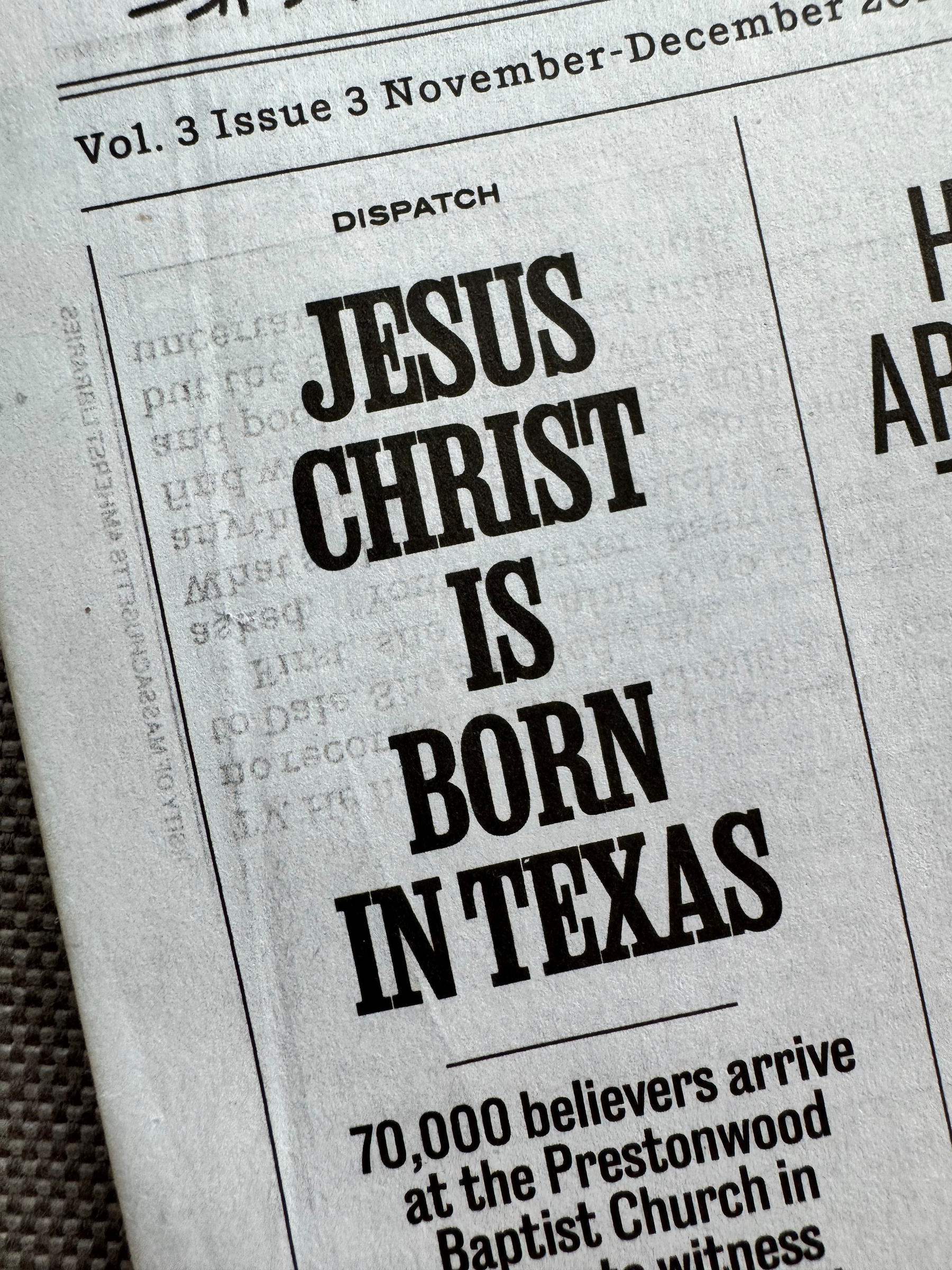huge if true

The ability to exchange mundane information from afar — even from across the street at a friend’s house — is part of being a whole person in the world today…. Like it or not, becoming a person in the 2020s means becoming a user of computers. It also means figuring out how to express yourself online.
Question: If those who do not regularly use internet-connected devices and do not express themselves online are not persons, what are they?
This is the pinnacle of my blogging — so far, anyway. And only a few parenthetical words are my own.
Soup stage: completed. Next up: nap stage.

Soup stage: initiated

At this point, AI tools like Gemini should be able to make most digitized handwritten documents searchable and readable in transcription. This is, simply put, a major advance that we’ve been trying to achieve for a very long time, and a great aid to scholarship. It allows human beings to focus their time on the important, profound work of understanding another human being, rather than staring at a curlicue to grasp if it’s an L or an I. Could we also ask Gemini to formulate this broader understanding? Sure we could, but that’s the line that we, and our students, should resist crossing. The richness of life lies in the communion with other humans through speech, the written word, sounds, and images.
This is good news not just for scholars, but also for writers. I do a great deal of writing by hand, and would do more except for the annoyance of getting what I write into publishable form. I have a system, but it’s not good enough. Perhaps I will soon have a better one. ✍️
Re: this post, I wrote to another friend: “I spent decades teaching students to write critical essays. I talked and wrote a great deal about what makes a good thesis, what makes good evidence, how to avoid the mechanistic formulae students were taught in high school, etc. And here at the end of my career I have stopped doing all that, because, thanks to chatbots, almost no university students will ever again write their own critical essays. This change feels like a liberation and an abdication at the same time.”
Psychedelics are remarkably helpful in coming to see what an utter farce human institutions are: academia, celebrity, media, elections, prize committees, social distinction of any sort, nations, wars—vanity of vanities! “It is all ridiculous, when you think of death,” the atheist writer Thomas Bernhard said upon being given some distinction or other. He was right, of course, but he could not detect a certain significant corollary that only becomes clear when you look beyond death: that a life spent working in full knowledge of our true nature, as mortal sinners offered the infinite gift of redemption, can be a pretty wonderful thing, even if, incidentally, some prizes and distinctions happen to come our way in the course of it.
Lionel Trilling in 1974, prophesying:
This desire to fashion, to shape, a self and a life has all but gone from a contemporary culture whose emphasis, paradoxically enough, is so much on self. If we ask why this has come about, the answer of course involves us in a giant labor of social history. But there is one reason which can be readily isolated and which, I think, explains much. It is this: if you set yourself to shaping a self, a life, you limit yourself to that self and that life. You preclude any other kind of selfhood remaining available to you. You close out other options, other possibilities which might have been yours. Such limitation, once acceptable, now goes against the cultural grain — it is almost as if the fluidity of the contemporary world demands an analogous limitlessness in our personal perspective. Any doctrine, that of the family, religion, the school, that does not sustain this increasingly felt need for a multiplicity of options and instead offers an ideal of a shaped self, a formed life, has the sign on it of a retrograde and depriving authority, which, it is felt, must be resisted.
For anyone concerned with contemporary education at whatever level, the assimilation that contemporary culture has made between social idealism, even political liberalism, and personal fluidity — a self without the old confinements — is as momentous as it is recalcitrant to correction. Among the factors in the contemporary world which militate against the formulation of an educational ideal related to the humanistic traditions of the past, this seems to me to be the most decisive.

Currently reading: Questioning Minds: The Letters of Guy Davenport and Hugh Kenner, ed. Edward M. Burns. Two volumes, nearly 2000 pages. Lots of academic and literary gossip punctuated by extended passages of intellectual fireworks. When it’s good it’s great. It will take me a long time to read it; I have made a pledge to myself to be patient. Burns made the decision to annotate everything — there must be 250 pages of notes here — but he still manages to leave out some things that need to be explained, and fails to correct many misspellings while also “correcting” spellings that were right. Moreover, from time to time he will add a note referring the reader to a letter that isn’t here, or is misdated and therefore unfindable. I can’t blame him: the task was immense and he made it immenser than it needed to be, so the opportunities for error number in the thousands. I’m sure I would’ve done worse. Still, one must come to this prepared to be often confused, or brought up short by editorial mistakes. Posts will be forthcoming. 📚
Robin Sloan: “In the late 2020s, I think a lot of people are going to discover that their job has become: ‘Translate your work into code. Translate yourself, while you’re at it.’”
TIL that the great literary critic Hugh Kenner once contemplated writing a novel about a Texas philanthropist named George Oilwell.
I wrote a while back about the A.I. business model — which is basically the big machine-learning companies telling that they’ll sell us the antidote to the poison they have administered — but this post gives a twist to the whole situation: When businesses start to realize that they’re paying vast amounts to get LLMs to do tasks that could be accomplished by a old-school coder writing a regex script … “I do think we’re about to see a lot of companies realize that a thinking model connected to an MCP server is way more expensive than just paying someone to write a bash script. Starting now, you’ll be able to make a career out of un-LLM-ifying applications.”
The Prince of This World’s tools will never dismantle the Prince of This World’s house.
Charlie Warzel and Matteo Wong:
What’s undeniable is that we’re all living in a world where the whims and desires of wealthy and powerful men create uncertain, unstable conditions for everyone else. Although no other major chatbot has gone ballistic in the same ways as Grok, any one of them could be subtly tweaked to promote a given viewpoint over another, or to quietly manipulate users toward whatever purpose. Likewise, any major creator of AI models unwittingly [AJ: or wittingly] instills biases in its chatbots that are then difficult to expunge. Every user of mainstream AI or social media is subject to a calculus that they have no control over.
So maybe don’t use mainstream AI or social media?
